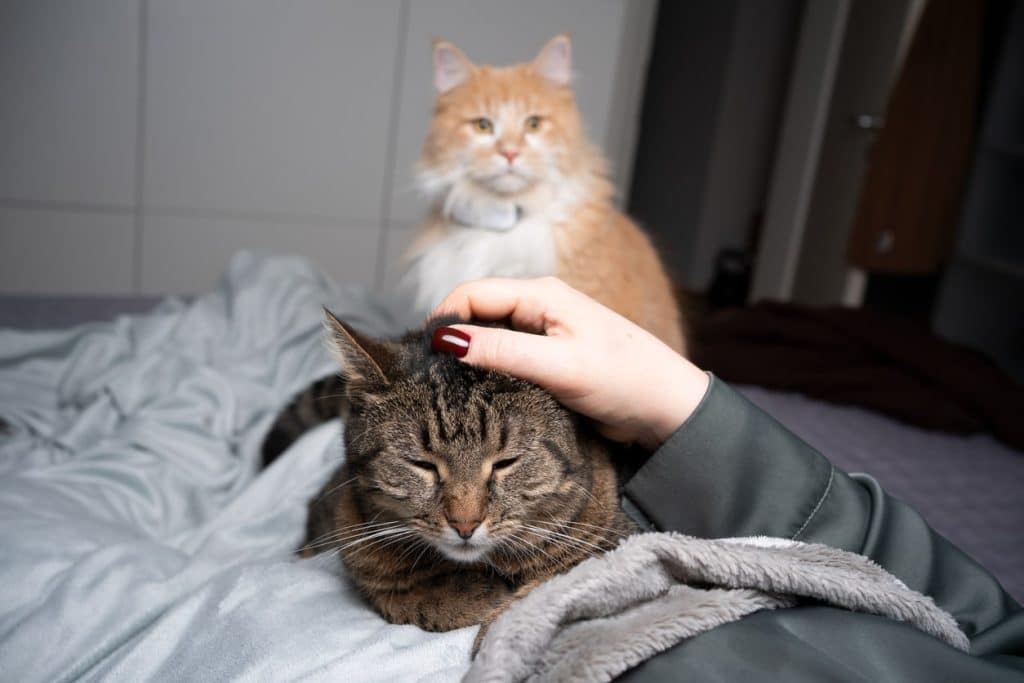If you believe all the horror stories about cats, you might have a sneaking suspicion cats are jealous animals. Studies have found that cats experience a spectrum of emotions, including empathy and grief. However, can cats feel jealousy too? No. Jealousy is a complex emotion, and cats don’t experience it as we define it.
According to Laura Cassiday, certified cat behaviour consultant and founder of USA-based Pawsitive Vibes Cat Behavior & Training, behaviours often confused with human jealousy are stress-induced and related to resource-guarding. Cassiday says because cats thrive on routine and predictability, significant changes like a new kitten, baby, or roommate can trigger this stress. Unlike human jealousy, cats’ defensiveness around their favourite resources is how they warn other animals and humans.
Read on as we take a closer look at and clear up misconceptions about jealousy in cats.
Why It Seems Like Cats Get Jealous
What’s perceived as jealousy is often just normal behaviour for cats. Dr Mikel Delgado, certified cat behaviour consultant, founder of Feline Minds, and Rover’s resident cat expert says by nature, cats want easy access to essential resources like food and human attention. Conflict and stress that get confused for jealousy flare up when cats are forced to compete for access to these resources.
Additionally, she says sometimes new arrivals and new routines activate your cat’s sense of self-preservation; they see them as threats to their safety. These new housemates also often mean that you (and your cat’s other human caregivers) might give them less attention and care than usual.
Lastly, Dr Delagado says one of the best ways cat parents can help their cat accept changes is by keeping up with established mealtimes, playtime, and grooming routines around the same time each day.

iStock/Nils Jacobi
10 Behaviours Mistaken For Cat Jealousy
What’s often mistaken for cat jealousy are stress behaviours. Cassiday and Delgado say these stress behaviours manifest differently depending on your cat’s personality and circumstances and include the following.
- hiding
- overgrooming
- urinating outside of the litterbox
- spraying
- changes in appetite and eating habits
- increased vocalisation, including meowing, howling, and yowling
- hissing and growling
- gastrointestinal issues
- physical aggression
- attention-seeking behaviours
Do Cats Get Jealous of Other Animals?
In multi-cat households, Cassiday says cats spray and pee in response to conflict with others when they feel insecure and defensive. Another jealousy-like stressed behaviour is when cats physically fight over their resources of choice—a sunny spot on their window perch, a cardboard scratcher, or their dinner bowls.
For indoor cats, seeing others roaming outside can also trigger jealousy-like behaviour. For example, if cats in your neighbourhood choose your garden to hang out in, it could make your cat feel territorial and possessive.
Lastly, in your cat’s mind, new pets, such as dogs, jeopardise your cat’s more solitary competition-free lifestyle. Provide more resources, like food bowls, litter boxes, cat towers, and other things your cat highly values to help diffuse tense situations.

iStock/supersizer
Do Cats Get Jealous of Babies?
With plenty of planning, preparation, and patience, a new baby will be less of a stressor and more of a curiosity for your cat. Expectant parents should prepare their cat for the baby’s arrival months in advance. Some recommendations include the following.
- Play recordings of babies crying, gradually raising the volume to a lifelike volume
- Set up cribs, changing stations, playpens, and baby furniture
- Introduce your cat to the smell of baby lotions and powders you’ll use
- Let your cat sniff items with the baby’s scent on them
Do Cats Ever Get Jealous Of Your Attention?
If you’ve ever seen cats sprawled out on laptops or sitting on the table during game night, you might wonder if cats get jealous of your attention.
The reality is their kitty logic isn’t nefarious. Instead, Dr Delgado says cats quickly learn how to get their favourite human’s attention and often enjoy being in the middle.
Actively showing attention-seeking behaviours “doesn’t mean they are angry or unhappy,” Delgado says, “They’re just doing what they know works, injecting themselves into a situation to make fun things happen!”
When Is Jealousy A Problem In Your Cat?
Jealousy-like behaviours, like resource guarding and possessiveness, become problematic when your cat defaults to aggression.
Cassiday says aggression “warrants immediate intervention by separating the cats and/or people and contacting a vet and cat behaviour consultant.”
When these stress-induced, jealousy-like behaviours come out as physical aggression. It could lead to injuries, serious medical issues, and secondary health problems like overgrooming, loss of appetite, and house soiling.

iStock/Timbicus
What Can You Do About Cat Jealousy?
The most powerful way to combat behaviours that seem like cat jealousy is to have extra resources on hand. These include litterboxes, toys, and cat furniture. Additionally, stick to routines, and spread your attention between cats as evenly as possible.
One of the best ways to help your cat manage stress is to set aside 10-15 minutes in the morning and evening for some one-on-one time. “Play improves confidence and reduces stress in cats, as does routine and predictability,” Cassiday says.


